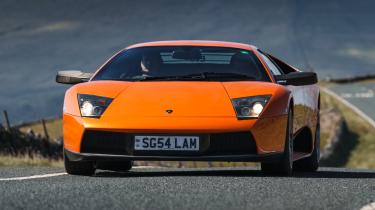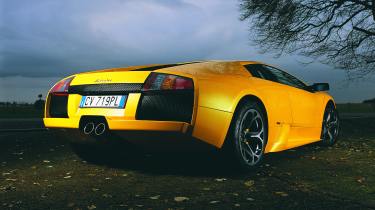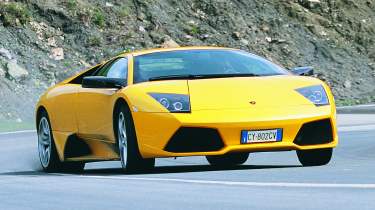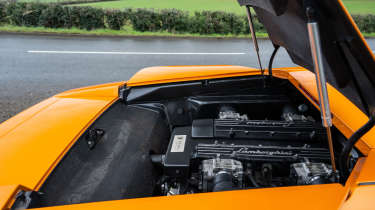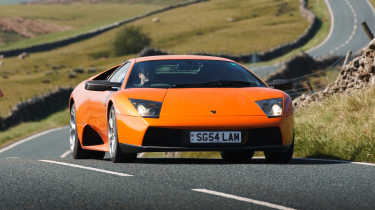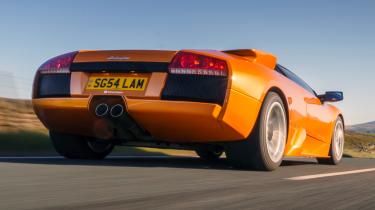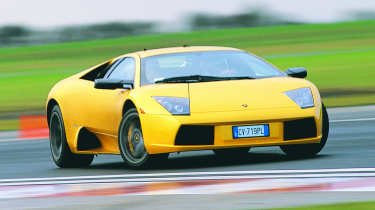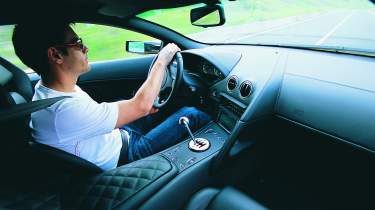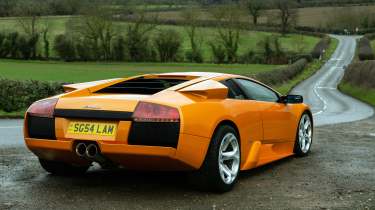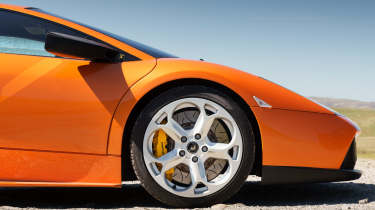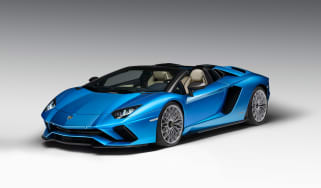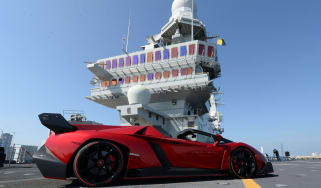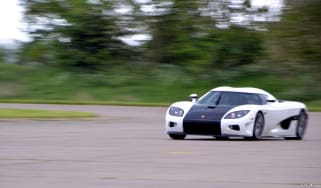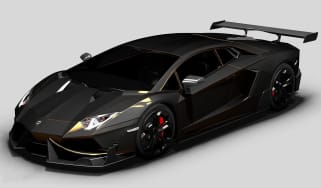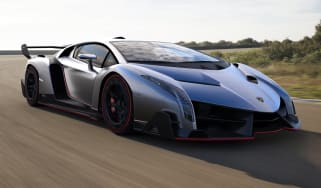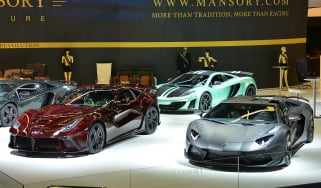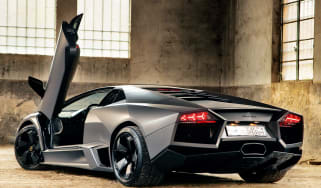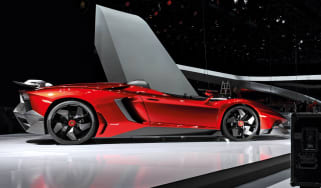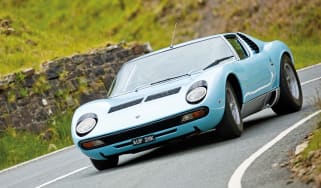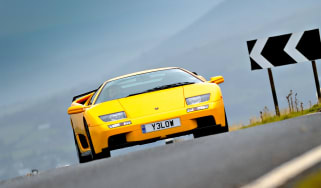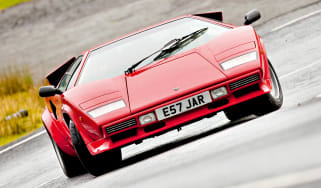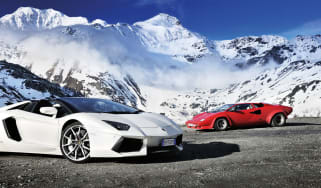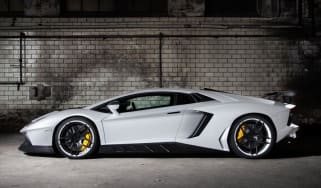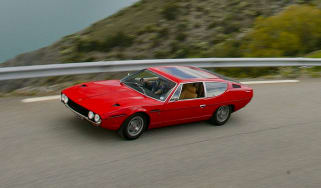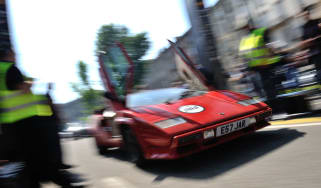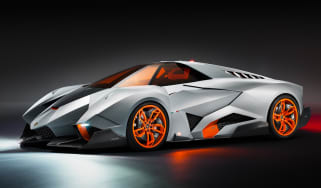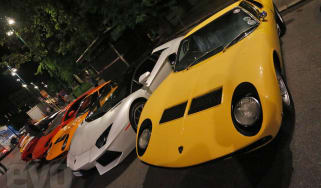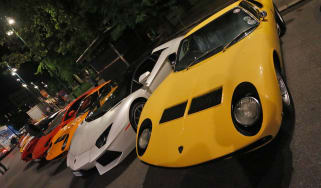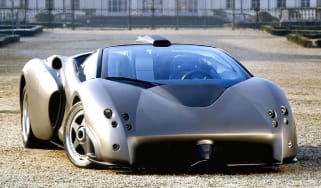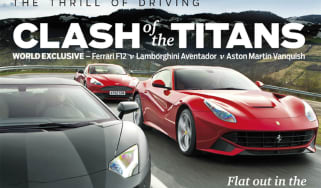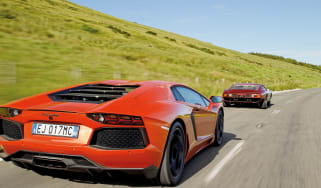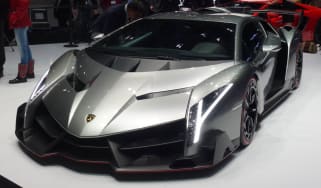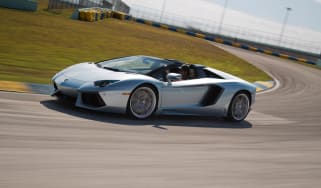Lamborghini Murciélago (2001 - 2011) review – an unadulterated supercar icon
The Murciélago spans old and new testament in the good book Lamborghini, melding old-school character with modern usability
The Lamborghini Murciélago and evo have a long history together. It was the first all-new Lamborghini to come out since the magazine’s founding and indeed, the first of the firm’s Audi-owned era. It’s also a car we’ve had repeated and unprecedented exposure to, with friend of the magazine and contributor Simon George documenting the journey to 300,000 miles and beyond with his own car in evo’s Fast Fleet pages.
It’s a car that straddles old-school and modern supercars and as such is a good car with which to take the pulse of the 2000s era of performance cars. This was a time of increasing sophistication but still one of cars with acceptable proportions and kerb weights, as well as expressive and emotive powertrains. The Murciélago was a shoo-in, then, for our evo Eras: the 2000s test.
History
At the time of Audi’s takeover it had inherited a replacement for the Diablo called the Canto, which although dramatically styled was a non-starter aerodynamically. To give their preferred designer, 36-year-old Luc Donckerwolke, time and the freedom of a clean sheet, they had him tidy up the fussy Diablo GT and the result was the VT 6.0.
That car showed that the Germans took their stewardship of the Italian brand seriously, because the VT didn’t just look great, it drove really well too. Well enough to see off the first Pagani Zonda, the C12, in ‘The Test’, a gathering of six supercars in the Val d’Orcia in evo 022. Despite the pressure of being the first non-Italian to design a Lamborghini, proof that Donckerwolke nailed it is that here and now, two decades on, the Murciélago still looks fresh and draws a crowd.
Lamborghini was quick to iterate with the Murciélago, adding the open-topped, fiddly-roofed Roadster to the lineup in 2004 in addition to the little-known 40th Anniversary model, which followed in the footsteps of the Diablo SE30 and Countach 25th Anniversary. A ceramic brake option and a tickle (quietening) of the exhaust followed in 2005 before the big changes started to happen.
The LP640 arrived in 2006 with more aggressive contemporary styling, a bigger, much more powerful V12 (it’s in the name) and a more aggressive exhaust note to boot. Whether deliberate or not, the 640 was a potent response to the vocal minority that claimed the Murciélago was a little staid on its release in 2001.
The LP640 Roadster followed, then Balloon white Versace Editions of both, as well as the limited-run 50-off LP650. This nominally more powerful Roadster was recognisable by its colour scheme – Grigio Telesto flat grey with Arancio orange accents. Then followed the 2009 LP670 Super Veloce, a riotous and flamboyant send-off for the Murciélago, which by the end of the decade was starting to show its age. Arriving right as the effects of the 2008 financial crisis were beginning to manifest, it should come as no surprise that just 186 of the planned 350 units were produced.
The Murciélago was the first Lamborghini to offer both a manual and an automated paddle-operated manual transmission. The latter, named ‘e-gear’, was enormously popular, if flawed in terms of its operation and reliability, so manual Murciélagos now command an enormous price premium. The Murciélago is the last V12 flagship Lamborghini to use a steel construction (not a bad thing) and the last to house the iconic Bizzarrini V12 engine (a shame), various derivations of which had powered most Lamborghinis since the first in 1964, and including all the flagships going back to the Miura.
Engine, gearbox and technical highlights
Based largely on the drivetrain of the all-wheel-drive Diablo VT 6.0, the Murciélago saw the Bizzarrini V12 uprated to 6.2 litres and 570bhp with variable valve timing, drive-by-wire throttle and, crucially, a dry sump, allowing the engine to sit 5cm lower in the chassis – a tubular steel item with a carbonfibre honeycomb centre section that improved stiffness over the Diablo by 60 per cent. Braking was still via conventional steel disks to begin with before carbon ceramics became an option in 2005.
For the LP640 its engine grew to 6.5 litres thanks to increased bore and stroke, with revisions to the cylinder heads, intake and exhaust system adding up to a heady 631bhp output. The LP670 SV increased power output again to 661bhp, while adding aggressive aero addenda (the so-called 'aeropack' they all seem to have with that big wing was actually an option), stiffening the platform, reworking the suspension and dropping the weight by 100kg – this was the most hardcore, performance-oriented Murciélago.
All Murciélagos were available with a six-speed stick’n’pedal manual transmission (even the SV, with the handful specified as such now worth multi-millions), or an automated single-clutch paddle-operated manual transmission. This in effect replaced your left leg with a computer-controlled actuator for the clutch, and though it improved over the course of the Murciélago’s life, it was always considered a bit sluggish and crude – the latter exemplified in the frequency of clutch changes required on e-gear cars.
Instead of a stick there were paddles behind the wheel to go up and down the gears, that we’re all too familiar with now but were still novel in 2001. All Murciélagos also featured Lamborghini’s viscous traction all-wheel drive system, which split power 30:70 front to rear in standard operating conditions.
Driving the Lamborghini Murciélago
‘Dynamically, it was a revelation, the most approachable V12 Lamborghini ever, and it came out top in a triple test with the new Aston Martin Vanquish and Ferrari 575 HGTC on the Route Napoléon. Then at eCoty it finished third behind the E46 BMW M3 and the winning Zonda C12‑S, Pagani getting its revenge.
‘Dickie has already refreshed his memory. ‘It’s all very much rooted in ’70s supercars, not 21st-century supercars,’ he says. ‘In the general operation of the car there’s a sort of unwieldiness and awkwardness that I found quite a surprise and really hard work after not very long in the car. Epic engine, obviously, and making allowances for the age and miles, but yeah, it leaves you pretty wide-eyed, to look at, to get in and the whole driving environment and the sound and the physicality of it.’
‘Door pointing skywards, you hop across the sill and drop down into a wide car, the massive windscreen seemingly near horizontal. The ergonomics don’t feel quite as natural as I recall, everything somewhat offset, and the seat lacks the adjustments for me to get comfy. That’s age for you, mine and the car’s. Turn the key and, Lordy, what an engine. ‘Buy the engine, get the rest of the car for free’ is often credited to Enzo Ferrari, but it’s just as true of a V12 Lamborghini because this motor is epic, the heart of the car, the dominant feature.
'There’s a proper resonant period at about 2500rpm, then it all cleans up, and when straight, well-sighted roads present themselves, the throttle goes to the stop. The V12 digs deep and the needle begins to climb the rev-counter, quickly… but every time it starts to get interesting, the engine stumbles. Turns out you have to press the TCS (traction control system) button to turn it off because it’s set very conservatively.
‘It’s a proper, full-on, blood-and-thunder noise when you go for the 7500rpm red line, and it’s a properly quick car too. The kerb weight helps; the Murci is a blend of ’60s welded spaceframe and 2000s carbonfibre, topped with aluminium bodywork that brings it in at 1660kg before fluids. In some respects the gearshift feels like it’s done all 300,000 miles, the way it slips effortlessly around the open gate as if all the edges have been smoothed away, but you still have to finesse it. The car will let you know if you don’t get it just right, grinding gears barking in your hand.
‘The steering initially feels a little bit light, and then once you’re rolling, the assistance drops away and at speed in bends it becomes a bit of a wrestling match. Dynamically, the Murciélago’s pretty well poised, but bring some pace and you know that most of the mass is right there behind you. Having looked back at shots of younger me power-sliding it back in the day, it would seem that while its looks may have defied age, time has caught up with its dynamics. It remains a magnificent beast, nonetheless.’ – John Barker, evo editor-at-large, who tested the Murciélago alongside other icons of the 2000s in our evo Eras: the 2000s test.
‘It's a relief to find that from the driver's seat the Murciélago's character and appeal remain intact. Inside, the sound of the engine's exertions is largely undiminished, and the big V12 remains a mighty, energetic and stimulating force at your back, climbing to its red line with an epic, ever-changing soundscape that finally hardens and resolves for the stomach-flipping lunge to the limiter.
‘The Murciélago's driving position feels good but, after so many miles in Gallardos, you notice more quickly that it is slightly compromised. You occasionally brush your knees against the underside of the fat steering column, and while the seats and pedals are aligned, the instrument binnacle sits slightly off-centre.
‘There's no denying that the Murciélago feels intimidatingly wide and heavy, but equally it takes only a few miles to appreciate that it rides typically bumpy British roads with great poise, delivering plenty of feedback through the small, meatily-weighted steering wheel. However, reflecting its rear-biased weight distribution, its front end doesn't feel as keyed in to the road surface as a Gallardo's, and although it too is four-wheel drive, on wet, greasy roads the traction control frequently reins back the engine.
‘In the dry, Murciélagos are faithful and exploitable, with high levels of grip and great composure. Shiny, slick UK roads mean the Murciélago's traction control seems intent on preventing the V12's massive torque inducing any slip at the rear. In truth, this is no bar to enjoying the Murciélago. Once you're comfortable with its size, you can drive it cross-country at a spectacular pace.
‘Naturally, it prefers wider roads where the glorious V12 can be stretched, but it's surprisingly effective on narrower stuff, the engine's instant delivery punching it past slower traffic given the smallest straight. And when you do find a long, dry straight stretching out before you, the V12 responds with a sustained and deep-chested ferocity that even the Gallardo SE can't match. It's still the daddy.
‘On track I was expecting the Murciélago to be a handful, but I thought power oversteer would be the issue. It's mass that's the enemy. On the road, pushing the accelerator early on a wet roundabout causes the front-end to run wide, but we're way beyond that, up to a pace where the whole mass of the car is energised. It's a delicate balance, keeping the front from washing out in the tightest turns and trying to be smooth enough to stop the rear overtaking us in the faster stuff. Braking is strictly in a straight line and all done before turning in.
‘The Gallardo is a much more approachable, driveable 500bhp supercar, no question, but the Murciélago is more of an event, more dramatically proportioned and styled, and an utterly absorbing drive. Yes, it's trickier on the limit, but you'd never go there on the road and nor do you have to in order to appreciate its fine ride and engaging dynamics.’ – John Barker, evo editor-at-large, who tested the Murciélago with its new carbon ceramic brake option on road and track in 2006.
Lamborghini Murciélago values and buying guide
Despite it being a mid-engined naturally aspirated V12 supercar available with a manual transmission, Murciélago values have taken a while to pick up, but now the most sought-after versions are catching up with the Porsche Carrera GT and Ferrari F40 – if not the multi-million pound stratosphere occupied by the Ferrari F50, Pagani Zonda and McLaren F1. A good manual Murciélago, especially an LP640, is now a million-plus-dollar proposition in the US, while manual examples list in the UK regularly for over £800k – more than the run-out Super Veloce. That'd have been music to Simon George's ears in 2007, when his car at 44,000 miles had a trade-in value of £85k...
Few cars out there show such a dramatic difference in price purely based on the transmission they feature, for an e-gear Murciélago of the same vintage in the same condition as a manual is worth less than half. A manual conversion could be tempting as a business proposition then, in addition to improving the Murci driving experience enormously.
The manual is the better car to drive but it’s also easier to operate and more reliable. The e-gear’s automated clutch is sluggish and slurs in unsympathetic general use, meaning clutch wear is accelerated compared with a manual (well, one that’s driven properly). This should be the number one touch point for anyone looking at a paddle-equipped Murci – when was the clutch last done and how much life is left in it?
Regular servicing should be a given. Murci’s aren’t shy about showing they’ve been neglected – they’ll smoke if they’re using oil or if the clutch is struggling. Generally speaking though, you’re going to want to buy with the aid of (or just directly from) a specialist and you’re going to want comprehensive history to understand the car you’re buying. Even the interiors are a bit delicate – Simon George’s 315,000-mile car has had no less than five interior retrims, though it did have a long career as a driving experience car, fulfilling the dreams of no less than 8000 supercar enthusiasts...
Specs
| Murciélago | LP640 | LP670 SV | |
|---|---|---|---|
| Engine | V12, 6192cc | V12, 6496cc | V12, 6496cc |
| Power | 570bhp @ 7500rpm | 631bhp @ 8000rpm | 661bhp @ 8000rpm |
| Torque | 479lb ft @ 5400rpm | 487lb ft @ 6,000rpm | 487lb ft @ 6500rpm |
| Weight | 1660kg (dry) (349bhp/ton) | 1665kg (dry) (385bhp/ton) | 1565kg (dry) (429bhp/ton) |
| 0-62mph | 3.8sec | 3.6sec | 3.4sec |
| Top speed | 209mph | 211mph | 212mph |
| Price new | £160k+ (2001) | £190k+ (2006) | £220k+ (2009) |
| In today's money | £301k | £330k | £353k |
| Value today | £180k+ | £220k+ | £600k+ |
